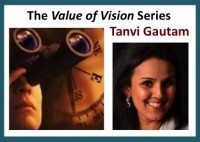
Vision: It’s All About the (Im)possible Story
Dr. Tanvi Gautam
Past perfect tense
I recall that evening quite vividly. I was at the end of the first year of my PhD program at the Katz Graduate School of Business. My father, also an academic and a strong role model for me, was visiting all the way from India.
While at dinner, he very casually asked me something that I will never forget.
He wanted to know what I envisioned was my future. Did I want to be a Dean or Vice-chancellor or something else? I almost choked on my food.
I had not even finished my course work, and here he was asking me about deanship!
At first I laughed at the question, but when I saw the serious look on his face, I knew he was not making small talk. He went on to elaborate how keeping that vision in mind would allow me to plot my trajectory, choose assignments, know which relationships I needed to establish now and what I had to prove in the next decade to be seen fit for a role that lay maybe two decades away.
But it was not the tactical aspects of that conversation that impacted me as much as what I experienced as I opened my mind for the first time to the possibility of Dr. Tanvi Gautam, Dean, Graduate School of Business…….I felt my energy shift.
The possibility. The potential. The promise. Of a future so grand that it seemed unreal.
A conversation so full of trust, realism and faith that you could not help but engage.
Fast forward
Many years later as I work with companies, I often wonder why most don’t feel energy around the vision they created. Why does the idea of the future never becomes an identity for them? Why does vision feel devoid of meaning? It is no surprise that some ask whether vision is relevant today.
My insight on the topic is based on the corporate storytelling work I do on transformational leaderships as well as storytelling for influence and engagement. You see, in storytelling, as noted by Aristotle, there must be logos (logic), ethos (ethics, credibility, values) and pathos (emotions).
Most visioning and vision statements miss the pathos element. If I got a dollar each time I heard about a company’s vision of becoming the employer of choice or being a talent magnet, I could retire tomorrow. These statements, thrown around everyday in the name of vision, are logical, credible, values-driven, but they lack emotional connection.
Last month I was working with a client whose people are highly data-driven. One might even say too data-driven. Ask them about the vision, and you were likely to get figures of ROI, market share, and other statistical facts and figures that leave you cold. Could this vision inspire the people who were crunching the numbers let alone the rest of the company?
So we undertook an activity to vision a future with no excel sheet! We created a giant board to act as the cover story of Time magazine, and we took a picture of the group, enlarged it and put it in the centre. We divided the page into cover story, feature article, quotes, sidebar and photos. The year was 2020. The task was to envision what would put them on Time magazine and why.
The shift in this left brain group as they created their stories had to be seen to be believed. The freedom to create a vision so grand that even the creators of it gasped as they created it led them to a new high. For the first time ever they were writing a story of their future. Their vision of possibility. Their ‘story’ of the future.
Not for a moment am I suggesting that we should ignore the strategic, tactical or operational. All I am suggesting is to give yourself the freedom to create a vision with which you have an emotional connection.
Future perfect tense
As someone said, it is not about what keeps you up at night, but what gets you going in the morning that matters.
What is the story that you will write about your future today that bears the energy and the emotion that will sustain action on days when nothing seems worth it?
And no, while I never did aspire to become Dean, I did recognize that the vision of my life had to be grander than what lay just in front of my nose. And as a result when most people ask why, I tend to ask why not? Because when you create a vision, anything is possible.
I hope that you will start writing your magnum opus story plot today, and may all your visions allow you to become larger than what you ever thought was possible.
 Dr. Tanvi Gautam (Managing Partner, Global People Tree) helps organizations adopt innovative talent management practices. One of less than 100 Story Coaches worldwide, she uses this powerful medium to transformation organizational culture and leadership.
Dr. Tanvi Gautam (Managing Partner, Global People Tree) helps organizations adopt innovative talent management practices. One of less than 100 Story Coaches worldwide, she uses this powerful medium to transformation organizational culture and leadership.
Recognized by the Business Manager magazine as one of the leading women HR professionals (2012), Dr. Gautam has been quoted and published in Harvard Business Review OnPoint, Forbes, Business Times, and Economic Times, among others. She serves on the board of ARTDO international (a Pan-Asian Leadership and HRD organization).
Dr. Gautam hosts her own podcast series WOWfactor where she highlights the thought-leadership of women across the globe. Follow her on Twitter @tanvi_gautam and connect on LinkedIn.














I think we should all dare to dream the big dream. We risk little by using this power of imagination and personal empowerment – although we may indeed risk moving away from our comfortable circle of familiar surroundings and known life patterns. A big life vision gives one energy to keep going when turbulence and confusion surrounds one’s world. Unfortunately, I meet too many people who have given up their willingness to create the big life vision – these people have become accustomed to the ordinary and customary way of living that the big vision is seen as impractical. Nevertheless, all talented and successful people have started out as ordinary people who have lifted their eyes and said, “I am good enough to make this happen.” They keep pushing forward and experience the plateau as well as the breakthrough.
Thanks Steve for your comment. Totally agree on the plateau and breakthrough as well. The power of the (im)possible story is also that when you hit the plateau the energy of the dream sustains you till the breakthrough (just like you noted about the turbulence and confusion). Again thank you for taking the time to comment.
Thank you for the reminder that having a vision is important – and it needs to be a vivid, detailed picture of the future we want in order that people have an emotional connection.
Thanks Alan. Loved how you used the language – vivid and detailed. I have found the more it is such, the greater the connection with the vision. Appreciate your taking the time to leave a comment.
Storytelling is the post powerful means of creating connection. All great teachers of the world spoke in stories. Great leaders must learn to do the same thing. Without connection, there is no engagement. I just worked with a senior-level retained search firm in the life sciences arena. When one of their team members uttered his take on all the words tossed about, the group took a sharp breath and collectively said, “Ohhhhh.” “We make life=changing placements so clients can change lives.” Talk about emotion!!!
P.S. The organization is Bench International.
Totally agree Eileen ! It leads to a shift in perspective like nothing else. Yet everyday I find boardrooms filled with meaningless numbers, charts and graphs. However, once they experience the magic, there is no going back 🙂 Thank you for sharing !
“it is not about what keeps you up at night, but what gets you going in the morning that matters.”
I have actually never heard that before, but find the perspective inspiring. I think people take it for granted that having no vision leaves you pretty much stuck with whatever life throws at you. While that may seem safe, in that you appear to have no risk of failing, you will likely “die with you music within you”
Thanks for the post
Thank you for your comment, Thabo. Like someone said – a ship is safe in the harbor but that is not what ships are for ! Sail on…….
A wonderful reminder, Tanvi, to connect with who we truly are: and it’s not automatons! I’m always amazed how an obsession with making money–which for many people is such an emotional issue in their personal lives–has the opposite effect and tends to overshadow more compelling aspirations within organizations.
I’ve experienced similar issues as you when working with participants at my strategic communication courses. Their default is always tactics. It seems so much easier for people to deal with day-to-day issues than to free themselves up and think bigger. They focus in on “what?” and “how?” without giving much regard to “why?” as you point out.
Maybe part of the problem is that we are always expected to be “doers” at work, not thinkers. Anyone staring out into the middle distance is thought of as a loafer. There is never enough time just to “be.”
I like to remind people that the reason Don Draper in Mad Men (well, at least in the early series) was such an advertising genius is because he spent so much time horizontal…on his couch. Those quiet moments offer wonderful opportunities for creative insights, including fresh choices for new directions that actually mean something to our human selves, not just our business roles.
Wouldn’t it be wonderful if just one business meeting a week was dedicated to daydreaming? What wonderful visions might emerge as a result!
Great post — thanks Jesse Lyn and Tanvi!
Dr. Liz, I think you are right, emotions are a more evolved space to be in. So yes, how and what is easier than the why. Thanks for pointing that out. And yes, despite us being human ‘be’-ings there is no time to ‘be’. Again, thank you for your wonderful insights and examples.
Hi Tanvi – that was a great story and an excellent example of how to open up your mind to co-creating a vision that values humanity in all its senses! I have led and engaged in this kind of co-creation process on a number of occasions and I never cease to be amazed at just how vivid and vibrant people can be when given ‘permission’ to be creative!
I think this speaks to a strong reason why target driven, results-oriented businesses and organisations are increasingly finding it harder to realise proper success!
Thank you for sharing your thoughts.
Thanks John ! Just today I finished a storytelling workshop where we talked about this element of ‘permission’. Some folks need permission to own their story but when they do some amazing things begin to happen 🙂